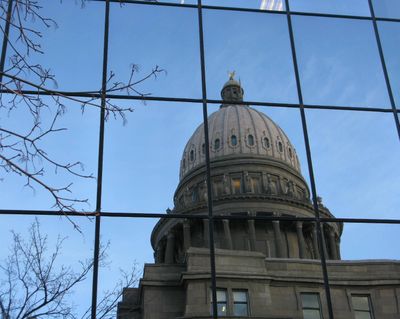Idaho legislature addressed some longstanding issues but didn’t close the health care gap

BOISE – Idaho lawmakers addressed some long-festering issues in the legislative session they wrapped up Friday, including a constitutionally deficient public defense system, firefighters’ job-related cancer risk and suicide prevention.
Legislators also helped out Republican incumbents by passing anti-abortion and pro-gun bills that they can tout in their primary re-election contests in May.
“I think we made strides on education funding,” said Sen. Shawn Keough, R-Sandpoint, noting the addition of a new four-year computer science degree in Coeur d’Alene through a cooperative program between North Idaho College and the University of Idaho and expansion of career-technical education classes in high schools statewide.
“In many ways I think it’s been a successful session for my district and North Idaho, and I think for the state as well,” Keough said.
Perhaps the biggest issue that didn’t see a resolution this year was Idaho’s health care gap – providing health coverage to the 78,000 Idahoans who make too little to qualify for subsidized insurance through the health care exchange, but too much to qualify for Medicaid. Many lawmakers hoped to offer solutions this year, but the effort fell short in the session’s final days. Still, the issue saw more interest and attention than lawmakers have previously been willing to give it.
Sen. Dan Schmidt, D-Moscow, a physician who’s pushed hard all year to get lawmakers to consider the coverage gap, said, “This was a win-win for me. I was very happy we got this conversation out there, folks recognizing the need to address this issue. It’s been put off so long. We’re not serving our state by doing that.”
Rep. Eric Redman, R-Athol, said Friday he planned to vote in favor of the Senate-amended health care bill, but after an hourlong, closed-door GOP caucus, he voted against it along with every other House Republican. “We just didn’t have the votes,” Redman said. “I wanted to do something, and I’m told that we can still move forward on it. I’m going to work with leadership to get something accomplished for the gap population.”
Redman pushed two bills of his own this year: one aimed at banning Idaho courts from considering foreign or Sharia law in decisions, and another aimed at allowing families in crisis to place their child temporarily with a host family vetted by a nonprofit. The anti-Sharia bill died on the amending order in the House; the other passed the House but died without a hearing in the Senate.
“That is frustrating, of course,” Redman said. “Provided I get elected, I’m going to bring those back next year.”
Rep. Heather Scott, R-Blanchard, said: “There were less tax cuts than I’d like to see. There were some advancements on solid conservative issues. It’s an election year, so it was all kind of safe legislation for the most part.” She cited the permitless concealed-carry bill as an example, which allows Idahoans age 21 or older to carry concealed guns without permits inside city limits.
Scott said she remains dismayed by what she calls a culture of “crony capitalism, special perks for special groups that is unacceptable.” She said, “My hope is that more citizens move up and be involved, because you get the government you allow.”
Rep. Luke Malek, R-Coeur d’Alene, said: “I think it was a very positive session in general. First of all, we moved this conversation (about health coverage) down the road better than we ever thought we could. We got a four-year degree program in computer science in Coeur d’Alene. We got two more crisis centers in the state of Idaho. We have a plan to expand broadband access to schools. … This was a pretty good year.”
Malek, who serves on the Legislature’s joint budget committee, was a key sponsor of the degree program, the crisis centers and the broadband bill.
He also was the sponsor of the measure that changed Idaho’s workers’ compensation law to presume that certain cancers are work-related for firefighters, something Idaho firefighters have been seeking for the past 16 years. The bill passed the Senate twice in recent years but failed in the House; this year, it became law.